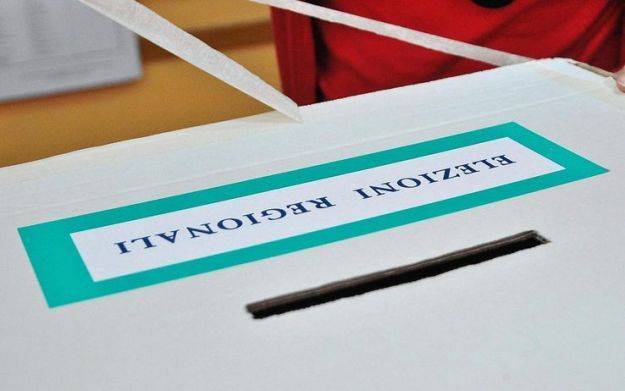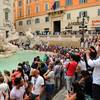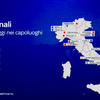In Regional Elections, Renzi Resists
Italians went to the polls on Sunday to elect seven regional governors and city counselors for 742 townships, including Venice, Mantua, Arezzo, Chieti and Agrigento. Premier Matteo Renzi’s Partito Democratico (PD) fared better than predicted: the center-left coalition came first in five regions, winning on average 37% of the vote in all seven. The center-right triumphed in the Veneto and Liguria
ROME – Driven to a last-minute rally at Segrate in Milan, where he was to speak, former Premier Silvio Berlusconi, 78, asked the name of the candidate. “Paolo,” came the smiling response. “Hey, guys, on Sunday get out and vote for Paolo!” Berlusconi shouted. But by then his handlers had learned that this was the wrong piazza and that Berlusconi was touting the wrong candidate, Paolo Micheli of the PD. Tugged back into his car, Berlusconi was whisked to the right piazza. (Berlusconi has since denied that this widely reported incident took place.)
Otherwise Sunday’s elections were no laughing matter. Up for election were governors of seven regions and city counselors for 742 townships, including 17 large cities representing altogether 23 million citizens. Among the cities were Venice, Mantua, Arezzo, Chieti and Agrigento. At 52.2%, the turnout was slightly lower than in the last regional vote, which took place in 2010, but took place over two days; this, just one day.
With the results counted (or most of them), Premier Matteo Renzi is under fire. “Goodby Mr. 40% of the vote,” trumped right-winger Brunetta. Nevertheless Renzi’s Partito Democratico (PD) nevertheless fared better than predicted. The center-left coalition, which included the Renzi PD, came first in five of the seven regions. A decline after a term in office is almost inevitable, but, while copping over 40% in elections two years ago, in this vote the average win of the PD coalitions across the seven regions came close to winning 37%.
The center-right triumphed in two regions, the Veneto and Liguria, where the battle was particularly hard fought. Across the board Berlusconi’s Forza Italia (FI) made a feeble showing, outperformed by Beppe Grillo’s Movimento Cinque Stelle (M5S). Despite that party’s bad press of recent months, the M5S claimed an average of almost 17% in the seven regions and, in Liguria, a surprising one out of four voters. Here is the bean count:
The walkup to the election continues was particularly fraught, and continues to cast a shadow over the results, however. For Renzi, the polls had been discouraging, and he was rightly concerned not only about the extent to which his breach with the PD left would weaken the party, but also about which of the intractable opponents would surge ahead to put at risk his centrist coalition: Grillo’s M5S or the Northern League of Matteo Salvini. For this reason some here argued that Renzi was keeping fingers crossed for, guess who, Berlusconi in hopes of avoiding M5S or Lega demands for a greater governing role. And just in case his PD took the poll-predicted shellacking, Renzi had declared ahead of time that, “I am not being tested.”
No less seriously, only two days before the vote, Senator Rosi Bindi of the left wing of the PD presented to the public a list of candidates whom the parliamentary Anti-Mafia Commission considered officially “unpresentable.” Bindi happens to chair that Commission, and was hotly criticized by, among others, author-journalist Roberto Saviano, who argued against the list – not because some of the candidates named are crooks, but because the criteria for determining that a candidate is “unpresentable” has never been defined.
Although the decision of the Anti-Mafia Commission is legal, candidates who consider themselves innocent had insufficient time for rebuttal. The media had every opportunity, in the months prior to the election, to let readers consider the validity of possible judicial proceedings of candidates. “Bindi wrecked the election campaign on the last useful day. Is this normal?” demanded MP Fabrizio Cicchitto, of the rightist party Area Popolare/
And did Commission decisions reflect political bias? For Raffaele Cantone, head of the national anti-corruption commission, “I’m uncomfortable with certain choices” because they were made by a group of politicians. At least a few of the decisions about candidates were debatable because they are from rival factions of Commission members, including in Bindi’s own party. Other critics charged that, because presenting the list generated such a massive protest, it in effect has undermined the work of the Anti-Mafia Commission itself.
“I feel bitter about the polemics raised by the Commission,” said Don Luigi Ciotti, the priest whose organization, Libera, has done seminal work in combatting the Mafia. “For years we have been fighting for political renewal and to clean up bad business, fighting against corruption and the people who flank organized crime. And now the Antimafia Commission, using its functions to the full, reduces itself to being a player in a power struggle among party factions.”





































i-Italy
Facebook
Google+
This work may not be reproduced, in whole or in part, without prior written permission.
Questo lavoro non può essere riprodotto, in tutto o in parte, senza permesso scritto.